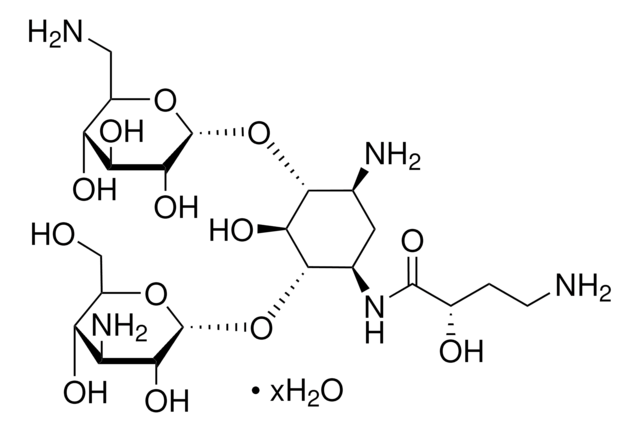T1783
Tobramycin sulfate salt
aminoglycoside antibiotic
Sinónimos:
Nebramycin Factor 6 sulfate
About This Item
Productos recomendados
biological source
Streptomyces tenebrarius
form
powder
potency
634-739 μg per mg
storage condition
(Keep container tightly closed in a dry and well-ventilated place. Hygroscopic.)
color
white to off-white
solubility
H2O: soluble 50 mg/mL
antibiotic activity spectrum
Gram-negative bacteria
mode of action
protein synthesis | interferes
storage temp.
2-8°C
SMILES string
OS(O)(=O)=O.NC[C@H]1O[C@H](O[C@@H]2[C@@H](N)C[C@@H](N)[C@H](O[C@H]3O[C@H](CO)[C@@H](O)[C@H](N)[C@H]3O)[C@H]2O)[C@H](N)C[C@@H]1O
InChI
1S/C18H37N5O9.H2O4S/c19-3-9-8(25)2-7(22)17(29-9)31-15-5(20)1-6(21)16(14(15)28)32-18-13(27)11(23)12(26)10(4-24)30-18;1-5(2,3)4/h5-18,24-28H,1-4,19-23H2;(H2,1,2,3,4)/t5-,6+,7+,8-,9+,10+,11-,12+,13+,14-,15+,16-,17+,18+;/m0./s1
InChI key
ZEUUPKVZFKBXPW-TWDWGCDDSA-N
Categorías relacionadas
General description
Application
Biochem/physiol Actions
Mode of Action: Binds to 70S ribosomal subunit; inhibits translocation; elicits miscoding.
Spectrum of Activity: Gram negative bacteria. Not effective against Enterococci.
Packaging
Caution
Other Notes
signalword
Danger
hcodes
Hazard Classifications
Acute Tox. 4 Dermal - Acute Tox. 4 Inhalation - Repr. 1B
Storage Class
6.1C - Combustible acute toxic Cat.3 / toxic compounds or compounds which causing chronic effects
wgk_germany
WGK 3
flash_point_f
Not applicable
flash_point_c
Not applicable
ppe
Eyeshields, Gloves, type P3 (EN 143) respirator cartridges
Certificados de análisis (COA)
Busque Certificados de análisis (COA) introduciendo el número de lote del producto. Los números de lote se encuentran en la etiqueta del producto después de las palabras «Lot» o «Batch»
¿Ya tiene este producto?
Encuentre la documentación para los productos que ha comprado recientemente en la Biblioteca de documentos.
Los clientes también vieron
Artículos
Antibiotics targeting bacterial ribosomes disrupt protein synthesis, a key process in bacterial growth inhibition.
Antibiotics targeting bacterial ribosomes disrupt protein synthesis, a key process in bacterial growth inhibition.
Antibiotics targeting bacterial ribosomes disrupt protein synthesis, a key process in bacterial growth inhibition.
Antibiotics targeting bacterial ribosomes disrupt protein synthesis, a key process in bacterial growth inhibition.
Nuestro equipo de científicos tiene experiencia en todas las áreas de investigación: Ciencias de la vida, Ciencia de los materiales, Síntesis química, Cromatografía, Analítica y muchas otras.
Póngase en contacto con el Servicio técnico












